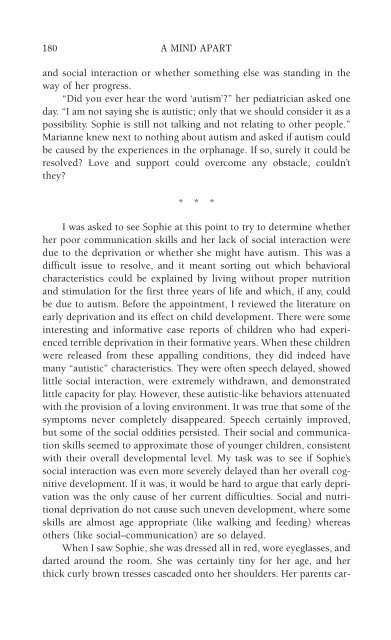978-1572305441
autism
autism
You also want an ePaper? Increase the reach of your titles
YUMPU automatically turns print PDFs into web optimized ePapers that Google loves.
180 A MIND APART<br />
and social interaction or whether something else was standing in the<br />
way of her progress.<br />
“Did you ever hear the word ‘autism’?” her pediatrician asked one<br />
day. “I am not saying she is autistic; only that we should consider it as a<br />
possibility. Sophie is still not talking and not relating to other people.”<br />
Marianne knew next to nothing about autism and asked if autism could<br />
be caused by the experiences in the orphanage. If so, surely it could be<br />
resolved? Love and support could overcome any obstacle, couldn’t<br />
they?<br />
* * *<br />
I was asked to see Sophie at this point to try to determine whether<br />
her poor communication skills and her lack of social interaction were<br />
due to the deprivation or whether she might have autism. This was a<br />
difficult issue to resolve, and it meant sorting out which behavioral<br />
characteristics could be explained by living without proper nutrition<br />
and stimulation for the first three years of life and which, if any, could<br />
be due to autism. Before the appointment, I reviewed the literature on<br />
early deprivation and its effect on child development. There were some<br />
interesting and informative case reports of children who had experienced<br />
terrible deprivation in their formative years. When these children<br />
were released from these appalling conditions, they did indeed have<br />
many “autistic” characteristics. They were often speech delayed, showed<br />
little social interaction, were extremely withdrawn, and demonstrated<br />
little capacity for play. However, these autistic-like behaviors attenuated<br />
with the provision of a loving environment. It was true that some of the<br />
symptoms never completely disappeared. Speech certainly improved,<br />
but some of the social oddities persisted. Their social and communication<br />
skills seemed to approximate those of younger children, consistent<br />
with their overall developmental level. My task was to see if Sophie’s<br />
social interaction was even more severely delayed than her overall cognitive<br />
development. If it was, it would be hard to argue that early deprivation<br />
was the only cause of her current difficulties. Social and nutritional<br />
deprivation do not cause such uneven development, where some<br />
skills are almost age appropriate (like walking and feeding) whereas<br />
others (like social–communication) are so delayed.<br />
When I saw Sophie, she was dressed all in red, wore eyeglasses, and<br />
darted around the room. She was certainly tiny for her age, and her<br />
thick curly brown tresses cascaded onto her shoulders. Her parents car-



